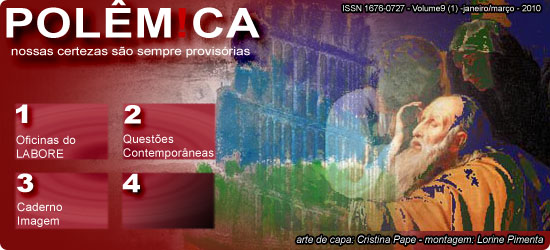FUNDAMENTOS TEÓRICOS PARA CONSTRUÇÃO DAS PRÁTICAS EM EDUCAÇÃO INCLUSIVA
DOI:
https://doi.org/10.12957/polemica.2010.2712Resumo
A Educação Inclusiva implica na mudança paradigmática de posturas e de interpretação acerca do fenômeno da deficiência. Nesse processo, a contribuição da Psicologia destaca-se justamente por fornecer fundamentos teóricos para o estudo do desenvolvimento e da aprendizagem humana. Este artigo discute as contribuições das teorias sócio-interacionistas de Vygotsky e Feuerstein e suas relações com duas tendências encontradas nas práticas em Educação Inclusiva: propositiva e analítica. Conclui-se que a prática atual em Educação Inclusiva se aproxima mais de um enfoque propositivo, diferentemente dos fundamentos teóricos aqui discutidos. Estes exigem analisar as implicações do processo inclusivo para a promoção do potencial de aprendizagem do aluno - objetivo final de uma educação inclusiva de qualidade, para todos.
Palavras-chave: Educação Inclusiva. Psicologia. Fundamentos teóricosDownloads
Publicado
Como Citar
Edição
Seção
Licença
Cabem ao autor/autora os direitos autorais dos artigos publicados na Polêm!ca, resguardando-se à revista o direito de primeira publicação. Cientes, revista e autores/as, que todos os artigos são de uso gratuito, para fins educacionais e não-comerciais, permitindo que outros remixem, adaptem e construam sobre o trabalho, desde que citada a fonte, quando da sua utilização integral ou parcial, de acordo com a licença Creative Commons CC BY-NC.
O(s) autor(es) tem/têm autorização para assumir contratos adicionais separadamente, para distribuição não-exclusiva da versão do trabalho publicada nesta revista (ex.: publicar em repositório institucional ou como capítulo de livro), com reconhecimento de autoria e publicação inicial nesta revista.
Respeitando a licença autoral adotada pela Polêm!ca, estimulamos nossos leitores a promover, refletir e escrever, a partir das nossas publicações, incluindo nas citações o link para o artigo disponível no site da Revista Polêm!ca, sempre que um artigo for citado ou replicado, e observando a grafia correta do nome da revista Polêm!ca.
Todo o conteúdo de terceiros (imagens, trechos, citações, etc.) deverá possuir referências a sua fonte original adicionadas como notas de rodapé ou referências bibliográficas com sua devida identificação.
Artigos submetidos que contiverem citações, tabelas ou imagens extraídas de outras publicações não serão aceitos, caso possuam mais conteúdo de terceiros do que conteúdo original.

Revista Polêm!ca está licenciada com uma Licença Creative Commons Atribuição-NãoComercial 4.0 Internacional.



